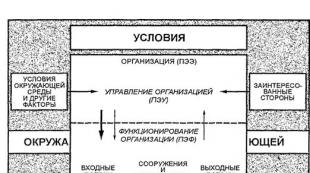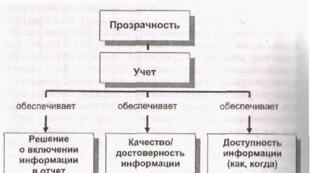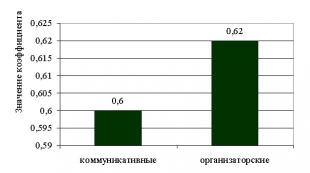State and municipal unitary enterprises as subjects. State and municipal unitary enterprises as subjects of civil law relations. What forms are there?
Unitary enterprise is a commercial organization that is not endowed by the owner with the right of ownership of the property assigned to it.
Such enterprises are called unitary enterprises, since their property is indivisible and cannot be distributed among deposits, shares, shares, shares.
Only state and municipal enterprises can be created in this form.
The corporate name of a unitary enterprise must contain an indication of the owner of its property.
The charter must clearly indicate who (the Russian Federation, which specific constituent entity of the Russian Federation or local government body) owns the property of the unitary enterprise by right of ownership. In this case, the property (state or municipal, respectively) belongs to a unitary enterprise with the right of economic management or operational management.
Types of unitary enterprises
Unitary enterprises can be of three types:
Federal State Unitary Enterprise (FSUE),
state enterprise of a constituent entity of the Russian Federation (SUE);
municipal enterprise (MUP) is a unitary enterprise of a municipality.
The essence of a unitary enterprise
Unitarity is a specific form of organization of activity, which is characterized by the following features:
creation of a legal entity through the allocation of certain property by the owner;
preservation of the founder's ownership of the transferred property;
assignment of property to a legal entity with the right of economic management or operational management;
indivisibility of the transferred property;
lack of membership;
the presence of a sole management body.
The main reasons for creating unitary enterprises
The main reasons why unitary enterprises are created include the following reasons:
carrying out certain subsidized types of activities and conducting certain industries operating at a loss;
carrying out activities to solve a number of social problems, including the sale of certain goods, works and services at minimum prices;
the need to use property whose privatization is prohibited.
The purpose of the activities of unitary enterprises
Since in accordance with paragraph 2 of Art. 50 and Art. 113 of the Civil Code of the Russian Federation, unitary enterprises are commercial legal entities, then their activities are aimed at generating profit in favor of the owner of the property - the state or municipality, as well as to cover their own expenses.
In addition, the purpose of the activity is not only to make a profit, but also to satisfy the interests of the state and provide for state needs.
At the same time, depending on the method of securing property, two types of unitary enterprises are distinguished (clause 2 of Article 113 of the Civil Code of the Russian Federation):
unitary enterprises based on the right of economic management (Article 114 of the Civil Code of the Russian Federation);
unitary enterprises based on the right of operational management (state-owned enterprises; Article 115 of the Civil Code of the Russian Federation).
Constituent documents of a unitary enterprise
The constituent document of a unitary enterprise is:
decision to establish a federal state enterprise. Such a decision is made by the Government of the Russian Federation or federal executive authorities in accordance with acts defining the competence of such bodies;
the decision to establish a state enterprise of a constituent entity of the Russian Federation or a municipal enterprise is made by an authorized government body of a constituent entity of the Russian Federation or a local government body in accordance with acts defining the competence of such bodies;
The document defining the management procedure of a unitary enterprise is its charter.
Charter of a unitary enterprise
The constituent document of a unitary enterprise is the organization's charter, which is approved by a ministry, department or other federal body.
The charter of a state and municipal enterprise must contain, in addition to the usual information characteristic of each legal entity, information about the subject and purposes of its activities, as well as the size of the organization’s authorized capital.
Statutory fund of a state unitary enterprise
The size of the authorized capital of a state unitary enterprise must be equal to no less than 5000 minimum wages, and that of a municipal unitary enterprise must be no less than 1000 minimum wages.
Property of a unitary enterprise
Methods of using the property of a unitary enterprise include the use of property by right:
economic management;
operational management.
With the method of economic management, a unitary enterprise (SUE, MUP) can dispose of the property assigned to it, manufactured products and income from the sale of goods, works or services independently, taking into account the current restrictions established by law.
With the method of operational management, a unitary enterprise (state-owned enterprise) has the right to dispose of the property assigned to it, manufactured products and income from the sale of goods, works or services only on the basis of the consent of the owner.
Sources of formation of property of a unitary enterprise
The sources of formation of the property of a unitary enterprise are:
- Unitary enterprises on interdependence
In this consultation, we will introduce accountants of unitary enterprises to the concept of “interdependent persons... organizations. For example, if a unitary enterprise owns 90% of the authorized capital... the rights of the owner of the property of the corresponding unitary enterprise are not recognized as interdependent... that the head of the unitary enterprise is recognized as interested in the transaction by the unitary enterprise if... relations with the unitary enterprise; in other cases determined by the charter of the unitary enterprise.
- ...
Facilitated procurement of medicines for unitary enterprises
- The creation of a state or municipal unitary enterprise is the need to carry out activities..., in particular: - state unitary enterprises, municipal unitary enterprises that are pharmacy organizations, if there is... it is indicated that state, municipal unitary enterprises that are pharmacy organizations carry out. .. 09/01/2017 state and municipal unitary enterprises that are pharmacy organizations have the right...
Can a unitary enterprise receive free economic... technical and technological modernization of production? A unitary enterprise can receive free of charge... the leased asset is taken into account on the balance sheet of the unitary enterprise - the lessee, it calculates depreciation... 03-06/2/82886. Example. A unitary enterprise acquired equipment under a leasing agreement... leased property is not taken into account in the current expenses of the unitary enterprise - the lessee. After...
- Property tax of state-owned enterprises
...], and is a unitary enterprise based on the right of operational management. The founder of a unitary enterprise, including... - Federal Law “On State and Municipal Unitary Enterprises”.
- Purchase and sale of land at a loss
In August 2019, the unitary enterprise acquired a land plot. In October... arrived? In August 2019, the unitary enterprise acquired a land plot. In October... -business transaction. To protect itself, a unitary enterprise can receive a report on the assessment... in full of the tax loss of the unitary enterprise based on the results of 2019, which...
- For the first time – publication of information on the average monthly salary of managers, their deputies and chief accountants on the Internet
Institutions; municipal institutions; state unitary enterprises; municipal unitary enterprises. Where exactly on the Internet... institutions, state and municipal unitary enterprises. Thus, the calculation of the average monthly... of federal state institutions, federal state unitary enterprises - by regulatory legal acts of the Government... of chief accountants of municipal institutions, municipal unitary enterprises - by regulatory legal acts of authorities...
- The Ministry of Labor explains...
The level of wage ratio (in particular, unitary enterprises), the following actions need to be taken: 1 ... it is unfair to ignore the Crimean unitary enterprises directly. Conditions of remuneration for their managers... state institutions and federal state unitary enterprises. According to this resolution, the relevant information... of chief accountants of government agencies, state unitary enterprises of the Republic of Kazakhstan (hereinafter referred to as the Procedure) is approved by the Resolution...
- On the transfer of part of the profits of UP Housing and Communal Services to the budget
Reporting? Like any other unitary enterprise, the municipal utility enterprise must... . In the organizational and legal form of unitary enterprises, state and municipal enterprises operate... -FZ “On State and Municipal Unitary Enterprises” (hereinafter referred to as Federal Law No. 161 ... 161-FZ provides for the annual transfer of a part of the profit by a unitary enterprise to the budget, therefore. .. for 2012 are missing. * * * The unitary utility enterprise is obliged to transfer to...
- Depreciation bonus as a way of tax optimization
Uses. Let us immediately note that a unitary enterprise is given this opportunity only for... use. Let us immediately note that a unitary enterprise is given such an opportunity only in... disagreements with the tax authorities. If a unitary enterprise uses the specified right, the corresponding... bonus. General rule Suppose a unitary enterprise decides to sell a fixed asset in... used in the construction of an object. Unitary enterprises can purchase fixed assets for...
- Changes to Law No. 44-FZ of 2018. New procurement rules
What to prepare for. For a year now, when making purchases, unitary enterprises have been guided by Federal... Law No. 44-FZ provides for the right of a unitary enterprise to refuse to conclude a contract since... .2018). It is from this date that unitary enterprises are in a situation where a procurement participant... to participate in such a competition. The unitary enterprise will be able to adjust the notice no later than... when the relevant unitary enterprises develop and approve the procurement regulations, the following information...
- New management salary
Federal state institutions, federal state unitary enterprises - regulatory legal acts of the Government of the Russian Federation... constituent entities of the Russian Federation; municipal institutions, municipal unitary enterprises - regulatory legal acts of the authorities... the conditions of remuneration for managers of state unitary enterprises (state enterprises, state-owned enterprises) ... institutions and federal state unitary enterprises are approved by the Decree of the Government of the Russian Federation...
- Free use of municipal property
Also state and municipal institutions, unitary enterprises. Property constituting the state (municipal) treasury... formation of municipal property constituting the treasury to a unitary enterprise for free use, paragraphs. 5 ... of real estate that makes up the treasury, a unitary enterprise does not have an obligation to pay ...
- Transformation of a telecom operator from a unitary enterprise to a joint-stock company: determining the cost of the operating system
Created in the form of a unitary enterprise, into a joint stock company? The transformation of a unitary enterprise into a joint-stock company... in the order of privatization when transforming a unitary enterprise into a joint-stock company is accepted to... by transforming state and municipal unitary enterprises. It turns out that the state and municipal... existing unitary enterprise. The creation of a joint stock company during privatization in the order of transformation of a unitary enterprise is...
- New Year 2018 – new procurement rules
What to prepare for. For a year now, unitary enterprises have been guided by Federal... No. 44-FZ when making purchases, providing for the right of a unitary enterprise to refuse to conclude a contract with... 2018). It is from this date that unitary enterprises are in a situation where a participant... participates in such a competition. A unitary enterprise will be able to adjust the notice no later than... in Law No. 223-FZ Unitary enterprises should be aware of the changes... there are other innovations. Unitary enterprises should know that from 31...
- Accounting for costs of allocated subsidies
Justify the correctness of your actions? A unitary enterprise was allocated a subsidy to carry out... normal activities. The unitary enterprise acted in accordance with the approved... based on the nature of the expenses (the position of the unitary enterprise); - or as part of others... the financial result underestimates the cost. The path chosen by the unitary enterprise contributes to... orderly accounting policies. * * * The position of a unitary enterprise is legitimate for the following reasons: the enterprise...
property that is transferred to the enterprise based on the owner’s decision to pay for the authorized capital;
other property that is transferred to the enterprise by decision of the owner;
profit that was received in carrying out the economic activities of the enterprise;
received credit and borrowed funds;
accrued amounts of depreciation charges;
capital investments made by the enterprise;
subsidies received from the budget;
Unitary enterprise: details for an accountant
A state unitary enterprise is a commercial organization that does not have rights to any property assigned to it by the owner of this property. It is also worth noting that a unitary enterprise can also be considered because its property is indivisible and does not provide for the possibility of distribution among deposits, including among the employees of this enterprise.
What is the essence of this enterprise?
It is worth noting that a unitary enterprise is a rather specific form of organization of activities. In particular, unitarity is characterized by the following:
- A legal entity is created through the allocation by the owner of a certain mass of property, and not by the association of property on the part of several persons.
- Full ownership of any property remains with the founder.
- Property is assigned to a specific legal entity with limited rights.
- Property is absolutely indivisible.
- The company has no membership option at all.
- The governing bodies are individual.
Why are they created?
Among the main reasons why managers prefer to create a unitary enterprise, the following should be highlighted:
- It is necessary to use certain property that cannot be privatized.
- It is required to carry out activities to solve certain social problems, including the sale of any services or goods at a minimum cost, as well as the organization of commodity and procurement interventions for goods classified as essential.
- Certain subsidized activities must be provided or any unprofitable production must be carried out.
The goal that a unitary enterprise sets for itself is to solve certain problems of the state on a commercial basis.
Features of work

The property that is allocated to a given enterprise in the process of its formation is in municipal or state ownership, while the company uses it on various rights, described below.
The company name that state and municipal unitary enterprises have must contain the name of the owner of the property assigned to this company.
The charter of the enterprise must include clear information about who exactly owns the property of this enterprise, that is, about the owner of all property. In addition, it is worth noting that state and municipal unitary enterprises are fully liable for their obligations with all their property, and at the same time do not bear any responsibility for the obligations of the owner of this property.
The body of a unitary enterprise is a responsible manager who is appointed directly by the owner himself or by some body authorized by the owner that is responsible to him.
What forms are there?

In accordance with the current Civil Code, unitary enterprises are formed exclusively in the form of municipal and state companies, which are based on different rights.
Based on the right of economic management
A federal state unitary enterprise, which is based on the right of economic management, is formed by a decision of a state body authorized for this action or a certain local government body.
In this case, the company’s charter is used as a constituent document, which in any case must be approved by a ministry, department or some other federal body that is vested with the functions of coordinating and regulating the activities of companies in this industry by current legislation. The charter that guides the federal state unitary enterprise must include, in addition to the standard information that is necessary for each legal entity, also information about the specific subject and various purposes of the activity of this enterprise and information about the size of the authorized capital. It is worth noting the fact that a unitary-type enterprise is the only commercial organization that has civil rights and responsibilities directly related to the activities outlined in the charter.
The authorized fund that a municipal unitary enterprise has must be greater than an amount equal to 1000 times the minimum wage per month, while a state enterprise must have a fund exceeding an amount equal to 5000 times the minimum wage. It is also worth noting that the owner must fully pay the authorized capital within three months after the organization is registered.
The owner of the property that is assigned to a given enterprise is not liable for the company’s obligations, except in cases where the bankruptcy of the company is a direct consequence of instructions from the owner of this property. The founder determines what kind of composition will guide the municipal unitary enterprise, as well as who exactly will be appointed as its manager.
Based on the right of operational management
Enterprises of this type are based on the property that is currently in federal ownership, municipal ownership, or the property of various constituent entities of the Russian Federation. Such a state unitary enterprise uses a charter as a constituent document, which is approved by the government, a subject of the country or a local government body that has the appropriate powers.
Thus, a state unitary enterprise cannot dispose of any property unless there is permission directly from the owner of the property.
The corporate name of the company, which is based on the right of operational management, in any case must include an indication that this enterprise is state-owned.
The Russian Federation, any of its subjects or a municipal entity in this case bear subsidiary liability for specific obligations that a federal unitary enterprise has if its property is insufficient. It is also worth noting the fact that the decision on the reorganization or complete liquidation of such enterprises is made directly by the government, a constituent entity of the Russian Federation or a certain local government body.
Property issues

The property of a unitary enterprise can be used in the following ways:
- Operational management.
- Economic management.
It is worth noting that the property of this enterprise is the property of the Russian Federation, its subject or a certain municipal entity, and is also at its disposal under various rights specified above.
If we are talking about economic management, then in this case the rights of a unitary enterprise include the ability to dispose of this property, as well as income and manufactured products, completely independently, taking into account various restrictions that are established by law and other legal acts.
In the case of operational management, an enterprise can dispose of property, its own products and income only if consent has been received from the owner.
The owner of the property fully resolves issues regarding the creation of an enterprise, the choice of a specific item, as well as the tasks that its activities set for itself, liquidation and reorganization. In addition, they exercise control over the use for a specific purpose and proper preservation of property belonging to the enterprise. It is worth noting that a production unitary enterprise can receive property from the owner exclusively as a contribution to the authorized capital or in excess of a certain authorized capital.
Management of a unitary enterprise does not provide for the possibility of establishing any subsidiaries, since there is a legislative prohibition on acting as a founder of any other unitary enterprises by transferring to them a certain share of their property for economic management. The need to use this prohibition is determined by the fact that it is impossible to remove the property of an enterprise from control through the creation of subsidiaries.
Where does the property come from?

The financial resources that a state or private unitary enterprise has have the same sources as all other commercial enterprises.
In particular, there may be several possible sources of formation of the property of such a company:
- Property that is transferred to the company by personal decision of the owner as payment for the authorized capital;
- Other property that is transferred by the owner to the management of the company at his own request;
- Profit that was received as a result of economic activities;
- Various borrowed funds, including bank loans;
- Depreciation deductions;
- Subsidies from the budget and various capital investments;
- Income that was received from various business partnerships and companies in the authorized capital of which this enterprise participates;
- Donations from enterprises, organizations, citizens or institutions;
- Other sources that do not contradict the current legislation of the Russian Federation, including income from the rental of certain property.
A unitary enterprise has the right to independently dispose of the active part of its funds. In particular, such a company can sell various vehicles, equipment, raw materials or inventory, as well as other material assets, to other enterprises, institutions or organizations in order to receive income from the sale of these assets.
Such a company does not have the ability to dispose of real estate in any way, and if necessary, its sale can only be carried out if this has been obtained with the direct consent of the owner of the property.
Coordination of various transactions of an enterprise with any property, the price of which is more than 150,000,000 rubles, is carried out by the Federal Agency for Federal Property Management, and this department in the process of its work is based on the decision of the Government of the Russian Federation or those decisions that, on its instructions, are made by the Deputy Chairman of the Government .
In accordance with the current government decree, various transactions related to the sale of federal real estate assigned to a federal state unitary enterprise with the rights of economic management are carried out through the sale of this property through an auction. The organizer in this case must be the enterprise itself or the person who acts on the basis of an agreement with a certain enterprise.
Activity programs

The relationship between a state enterprise and the owner of its property is fully regulated by current government regulations.
In particular, the resolutions approved the Rules for the development and subsequent approval of activity programs of unitary enterprises, as well as the determination of that part of the profit of such enterprises that should be transferred to the federal budget.
Features of finance

The features of finance in this case are based on the methods of forming sources for obtaining the company’s financial resources. The finances that a particular unitary enterprise has are significantly different from the finances of organizations and, first of all, the finances of joint-stock companies. These differences lie in the formation of the authorized capital, the receipt and further use of the profits received, as well as the attraction of third-party budgetary sources of financing or borrowed capital.
The authorized capital that unitary enterprises have is formed through assigned current and fixed assets, and its size is reflected in the company’s balance sheet as of the date of approval of this charter. The authorized capital of a unitary enterprise performs exactly the same functions as the authorized capital of any other commercial organizations. In addition to the fact that this fund is considered as a material basis for the enterprise’s economic activities, it is used as a basic indicator of its effectiveness.
If at the end of the financial year the price of the net assets of this enterprise is less than the minimum amount that was established on the date of the state organization, and at the same time, over the next three months, the value of the net assets is not restored to at least this level, in this case the owner of the municipal enterprise a decision must be made on its final liquidation.
35. State and municipal unitary enterprises as business entities.
A unitary enterprise is a commercial organization that is not endowed with the right of ownership to the property assigned to it by the owner. The property of a unitary enterprise is indivisible and cannot be distributed among contributions (shares, shares), including among employees of the enterprise.
The charter of a unitary enterprise must contain information about the subject and purposes of the enterprise’s activities, as well as the size of the authorized capital of the enterprise, the procedure and sources of its formation, with the exception of state-owned enterprises.
Only state and municipal enterprises can be created in the form of unitary enterprises.
The property of a state or municipal unitary enterprise is respectively in state or municipal ownership and belongs to such an enterprise with the right of economic management or operational management.
The property of a unitary enterprise is formed at the expense of: property assigned to the unitary enterprise on the right of economic management or on the right of operational management by the owner of this property; income of a unitary enterprise from its activities; other sources that do not contradict the law.
The right to property assigned to a unitary enterprise on the right of economic management or on the right of operational management by the owner of this property arises from the moment of transfer of such property to the unitary enterprise, unless otherwise provided by federal law or established by the owner’s decision to transfer the property to the unitary enterprise.
The corporate name of a unitary enterprise must contain an indication of the owner of its property.
The head of a unitary enterprise (director, general director) is the sole executive body of the unitary enterprise. The head of a unitary enterprise is appointed by the owner of the property of the unitary enterprise. The head of a unitary enterprise is accountable to the owner of the property of the unitary enterprise.
The head of a unitary enterprise acts on behalf of the unitary enterprise without a power of attorney, including representing its interests, makes transactions on behalf of the unitary enterprise in the prescribed manner, approves the structure and staff of the unitary enterprise, hires employees of such an enterprise, enters into contracts with them, changes and terminates employment contracts, issues orders, issues powers of attorney in the manner prescribed by law.
The head of a unitary enterprise organizes the implementation of decisions of the owner of the property of the unitary enterprise.
A unitary enterprise is liable for its obligations with all its property.
A unitary enterprise is not liable for the obligations of the owner of its property.
Unitary enterprise based on the right of economic management, is created by decision of an authorized state body or local government body.
The constituent document of an enterprise based on the right of economic management is its charter, approved by an authorized state body or local government body.
The size of the authorized capital of an enterprise based on the right of economic management cannot be less than the amount determined by the law on state and municipal unitary enterprises.
In cases and in the manner provided for by the law on state and municipal unitary enterprises, on the basis of state or municipal property, a unitary enterprise with the right of operational management(state-owned enterprise).
The constituent document of a state-owned enterprise is its charter, approved by an authorized state body or local government body.
The corporate name of a unitary enterprise based on the right of operational management must contain an indication that such an enterprise is state-owned.
The owner of the property of a state-owned enterprise bears subsidiary liability for the obligations of such an enterprise if its property is insufficient.
| " |
Unitary enterprises as legal entities have the following characteristic features:
- they are commercial organizations;
- these enterprises are characterized by the absence of ownership rights to the property assigned to it, the indivisibility of the enterprise’s property and the impossibility of distributing it among deposits (shares, shares), including among employees of the enterprise;
- the property of a state or municipal unitary enterprise is in state ownership and belongs to such an enterprise by the right of economic management or operational management;
- unitary enterprises are liable for their obligations with all their property and are not liable for the obligations of the owner of their property;
- The head of a unitary enterprise is appointed by the owner of the property (a body authorized by the owner) and is accountable to him.
The legislation provides for 2 types of unitary enterprises: a unitary enterprise based on the right of economic management and a unitary enterprise based on the right of operational management (state-owned enterprise). The first is created by decision of an authorized state body or local government body, and the second - by decision of the Government of the Russian Federation on the basis of property that is in federal ownership. State-owned enterprises are significantly limited in property rights. On the other hand, state-owned enterprises, unlike unitary enterprises based on the right of economic management, cannot be bankrupt, and the state bears additional responsibility for the obligations of such enterprises if their property is insufficient.
The Federal Law "On State and Municipal Unitary Enterprises" establishes the legal status of state unitary and municipal enterprises, the rights and obligations of the owners of their property, as well as the procedure for the creation, reorganization and liquidation of a unitary enterprise. In addition, it also regulates relations related to the property and authorized capital of a unitary enterprise, features of the management of a unitary enterprise, the responsibility of a unitary enterprise and other key aspects of the functioning of unitary enterprises.
If you do not find the information you need on this page, try using the site search:
Article posted date: 08/14/2017 Current issues of reforming unitary enterprises (Zolotko T.A.)The statement about the negative impact of unitary enterprises on the development of fair competition in the Russian Federation and the contradictions that arose in determining their organizational and legal form became a weighty argument in making a decision on their reorganization and liquidation. However, the arguments presented, in our opinion, are not so clear-cut; let us analyze them. |
|
Article posted date: 06/01/2017 Unitary enterprises in the contract system (Konysheva T.A.)According to Art. 1 of Law N 321-FZ, the effect of Law N 44-FZ from January 1, 2017 now extends to state and municipal unitary enterprises, with the exception of federal state unitary enterprises included in the list approved by the Government of the Russian Federation in agreement with the Administration of the President of the Russian Federation ( Federal Law "On Amendments to Certain Legislative Acts of the Russian Federation" dated December 28, 2016 N 474-FZ). |
|
Article posted date: 04/11/2017 Transition of unitary enterprises under the scope of Law N 44-FZ (Khramkin A.A.)Since 2017, unitary enterprises have switched to the contract system procurement regime, that is, they are beginning to apply the Federal Law of April 5, 2013 N 44-FZ “On the contract system in the field of procurement, work, services to meet state and municipal needs” (hereinafter referred to as Law N 44 -FZ, Law on the Contract System). A unitary enterprise is a commercial organization that is not endowed with the right of ownership to the property assigned to it by the owner (Article 113 of the Civil Code of the Russian Federation). |
|
Article posted date: 01/22/2016 State-owned enterprises and property tax (Denisova M.O.)The municipal government enterprise (hereinafter referred to as the MPE) received movable and immovable property for operational management. How should tax be paid on these objects? Which date is considered the date of acceptance of objects for accounting: the date of receipt of the property for operational management or the date of acquisition (creation) of this property by the founder of the enterprise (owner of the property)? Does a state-owned enterprise have the right to take advantage of the benefit from clause 25 of Art. 381 of the Tax Code of the Russian Federation and not tax movable property received for operational management later than 01/01/2013? |
|
Date of article posting: 03/14/2015 On the allocation of a branch of a unitary enterprise (Arkhangelskaya O.M.)The separation of a branch of a unitary enterprise into a separate legal entity can be achieved by reorganizing the enterprise. The decision on reorganization and the form in which it will be carried out is made by the owner of the property of the unitary enterprise. The most attractive reorganization for these purposes is in the form of a spin-off, as a result of which the previous enterprise continues to exist, and a new unitary enterprise is created on the basis of the branch. |
|
Date of article posting: 03/14/2014 Consent of property owners to perform legally significant actions by institutions and unitary enterprises (Boldyrev V.A.)The participation of institutions and unitary enterprises in civil circulation is limited by a number of rules on the execution of transactions and other legally significant actions with the consent of the owner. Limiting the ability to perform important legally significant actions with the consent of the property owner is a constitutive feature of the legal personality of these persons and at the same time indicates a seriously limited autonomy of the will of non-owner organizations. |
State and municipal unitary enterprises(hereinafter referred to as enterprise) are commercial organizations that are not vested with the right of ownership of property assigned to them by the owner; in this they differ from other commercial organizations.
The authorized capital of an enterprise is the minimum amount of property of an enterprise that guarantees the interests of its creditors, which can be formed from money, as well as securities, other things, property rights and other rights that have a monetary value.
Enterprises are an organizational and legal form through which commercial organizations - legal entities that are subjects of business law - carry out their activities (Articles 113–115 of the Civil Code of the Russian Federation).
The property of an enterprise is indivisible and cannot be distributed among contributions (shares), including among its employees.
Kinds:
- unitary enterprises based on the right of economic management - a federal state enterprise and a state enterprise of a constituent entity of the Russian Federation, a municipal enterprise;
- unitary enterprises based on the right of operational management - federal state enterprise, state enterprise of a constituent entity of the Russian Federation, municipal state enterprise.
The legal capacity of enterprises is not general, but special, i.e. they can carry out only those types of activities that are enshrined in the charter of the enterprise.
The activities of unitary enterprises in certain areas of business activity are limited.
By agreement with the owner of its property, a unitary enterprise can create branches and open representative offices.
A unitary enterprise is liable for its obligations with all its property and is not liable for the obligations of the owner of its property.
Owners of an enterprise's property are not liable for its obligations, except in cases where bankruptcy is caused by the owner himself, and if the property is insufficient, he may be assigned subsidiary liability for the enterprise's obligations.
Charter of a unitary enterprise- its only constituent document.
The enterprise disposes of movable property independently, to the extent that does not deprive it of the opportunity to carry out activities, except in cases established by law.
An enterprise does not have the right to sell the real estate it owns, rent it out, pledge it, or otherwise dispose of this property without the consent of the owner of the property of the state or municipal enterprise.
The owner of the enterprise's property has the right to receive part of the profit from the use of the property managed by the enterprise.
The company annually transfers part of its profits to the appropriate budget.
The activities of a unitary enterprise are carried out in accordance with the plan (program) of its financial and economic activities.
The head of a unitary enterprise is its sole executive body.
The specifics of the reorganization and liquidation of unitary enterprises are defined in the Law on State and Municipal Enterprises.









